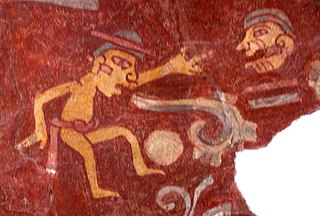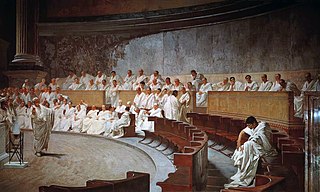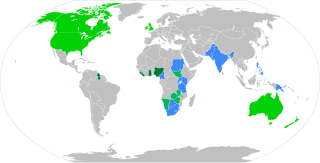
A language is a structured system of communication used by humans. Languages can be based on speech and gesture, sign, or writing. The structure of language is its grammar and the free components are its vocabulary. Many languages, including the most widely-spoken ones, have writing systems that enable sounds or signs to be recorded for later reactivation. Human language is unique among the known systems of animal communication in that it is not dependent on a single mode of transmission, is highly variable between cultures and across time, and affords a much wider range of expression than other systems.

Luxembourgish is a West Germanic language that is spoken mainly in Luxembourg. About 600,000 people speak Luxembourgish worldwide.

Maltese is a Semitic language derived from late medieval Sicilian Arabic with Romance superstrata spoken by the Maltese people. It is the national language of Malta and the only Semitic official language of the European Union. Maltese is a latinised variety of spoken historical Arabic through its descent from Siculo-Arabic, which developed as a Maghrebi Arabic dialect in the Emirate of Sicily between 831 and 1091. As a result of the Norman invasion of Malta and the subsequent re-Christianisation of the islands, Maltese evolved independently of Classical Arabic in a gradual process of Latinisation. It is therefore exceptional as a variety of historical Arabic that has no diglossic relationship with Classical or Modern Standard Arabic. Maltese is thus classified separately from the 30 varieties constituting the modern Arabic macrolanguage. Maltese is also distinguished from Arabic and other Semitic languages since its morphology has been deeply influenced by Romance languages, namely Italian and Sicilian.

Public speaking, also called oratory or oration, has traditionally meant the act of speaking face to face to a live audience. Today it includes any form of speaking to an audience, including pre-recorded speech delivered over great distance by means of technology.

Tswana, also known by its native name Setswana, is a Bantu language spoken in Southern Africa by about 8.2 million people. It belongs to the Bantu language family within the Sotho-Tswana branch of Zone S (S.30), and is closely related to the Northern Sotho and Southern Sotho languages, as well as the Kgalagadi language and the Lozi language.

Welsh is a Brittonic language of the Celtic language family that is native to the Welsh people. Welsh is spoken natively in Wales, by some in England, and in Y Wladfa. Historically, it has also been known in English as "British", "Cambrian", "Cambric" and "Cymric".
Hutterite German is an Upper German dialect of the Bavarian variety of the German language, which is spoken by Hutterite communities in Canada and the United States. Hutterite is also called Tirolean, but this is an anachronism.

A vocabulary is a set of familiar words within a person's language. A vocabulary, usually developed with age, serves as a useful and fundamental tool for communication and acquiring knowledge. Acquiring an extensive vocabulary is one of the largest challenges in learning a second language.

The Eskimo–Aleut, Inuit–Yupik–Unangan, or Eskaleut languages are a language family native to Alaska, Nunavut, northern Northwest Territories, northern Quebec (Nunavik), northern Labrador (Nunatsiavut), Greenland and far eastern Russia. It is also known as Eskaleutian, Eskaleutic or Inuit–Yupik–Unangan.

A first language, native tongue, native language, or mother/father/parent tongue is a language or dialect that a person has been exposed to from birth or within the critical period. In some countries, the term native language or mother tongue refers to the language or dialect of one's ethnic group rather than one's first language.
A heritage language is a minority language learned by its speakers at home as children, but never fully developed because of insufficient input from the social environment. The speakers grow up with a different dominant language in which they become more competent. Polinsky and Kagan label it as a continuum that ranges from fluent speakers to barely-speaking individuals of the home language. In some countries or cultures which determine a person's mother tongue by the ethnic group they belong to, a heritage language would be linked to the native language.

Speakers of English are sometimes known as Anglophones, and the countries where English is spoken natively by the majority of the population are termed the Anglosphere. Over two billion people speak English as of the 2000s, making English the largest language by number of speakers, and the third largest language by number of native speakers.
Linguistic determinism is the concept that language and its structures limit and determine human knowledge or thought, as well as thought processes such as categorization, memory, and perception. The term implies that people’s native languages will affect their thought process and therefore people will have different thought processes based on their mother tongues.
An indigenous language or autochthonous language, is a language that is native to a region and spoken by indigenous peoples. This language is from a linguistically distinct community that originated in the area. Indigenous languages are not necessarily national languages but they can be; for example, Aymara is an official language of Bolivia. Also, national languages are not necessarily indigenous to the country.
Pongu (Pangu), or Rin, is a Kainji language spoken in Nigeria. There are about 20,000 speakers. Their main centre is in Pangu Gari town of Niger State, about 20 kilometres southeast of Tegina. In Niger state, Rafi local government Kagara
The Interagency Language Roundtable scale is a set of descriptions of abilities to communicate in a language. It is the standard grading scale for language proficiency in the United States's Federal-level service. It was originally developed by the Interagency Language Roundtable (ILR), which included representation by United States Foreign Service Institute, the predecessor of the National Foreign Affairs Training Center (NFATC).
Kansa is a Siouan language of the Dhegihan group once spoken by the Kaw people of Oklahoma. Vice President Charles Curtis spoke Kansa as a child. The last mother-tongue speaker, Ralph Pepper, died in June 1982.
Satawalese is a Micronesian language of the Federated States of Micronesia. It is nearly intelligible with Mortlockese.
Papua New Guinean Sign Language (PNGSL) is a sign language originating from Papua New Guinea. The standardised form of PNGSL was made an official language of Papua New Guinea in 2015.









